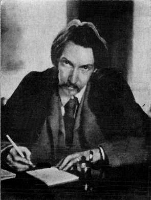Archive for March 2013
Poem dated
John Russell’s impressive work on RLS’s music can be seen on his Music of Robert Louis Stevenson site.
A recent addition is the page on a hymn written by RLS, ‘Tempest Tossed’ (‘Tempest tossed and sore afflicted, sin defiled and care oppressed, / Come to me, all ye that labour; come, and I will give ye rest….’), which he set to the music of Beethoven’s Sechs Leichte Variationen, WoO 77. Here the identification of the musical setting has enabled an accurate dating of the poem.
The text was first published by George Hellman’s in Poems Hitherto Unpublished (Boston: Bibliophile Society, 1916), as one of the poems of uncertain date. Hellman says that Stevenson wrote four titles at the top of the manuscript: Starry Evening, Adieu, Du Bist and Ständchen and claims these are poems by Heine. (This clearly refers to another MS than the one illustrated above: probably to B 6961, a second MS of ‘Tempest Tossed’ listed in McKay.)
John Russell writes:
Stevenson wrote down the four titles not because they were poems by Heine, but because they are all music by one of Stevenson’s favorite composers, Schubert. (‘Starry Evening’ is probably ‘Nachthelle’, op. 134 and uses a poem by Seidl. ‘Adieu’ is probably ‘Abschied’ from Schwanengesang, with lyrics by Rellstab, although there is also a melody attributed to Schubert called ‘Adieu’. ‘Du Bist die Ruh’ is Schubert’s op. 59, no. 3, on a poem by Rückert, and the famous ‘Ständchen’ is also from Schwanengesang, with lyrics by Rellstab. Stevenson arranged ‘Du Bist die Ruh’ for flageolet and also arranged two other songs from Schwanengesang not on Hellman’s list, ‘Ihr Bild’ and ‘Liebesbotschaft’.)
Hellman implies that ‘Tempest Tossed’ was written in the 1870’s, but in a letter of 6 December 1887 (L6, 76) Stevenson first asks Henley to send him Beethoven’s variations that he has chosen to set words to, but then decides he can send out for them himself from Saranac. Then on 18 December (L6, 84) he writes that he likes putting words to music and that “my last attempt is the divine theme of Beethoven’s Six Variations Faciles.” So apparently Stevenson had finished the poem and the musical setting between December 6th and December 18th, 1887.
In From Saranac to the Marquesas and Beyond, Stevenson’s mother Margaret writes in her entry covering the period from 19 November 1887 through 13 January 1888 that Lou “was busy all last Sunday afternoon arranging the words ‘Come unto me, all ye that labour’, etc. to an air of Beethoven’s.” “Come to me, all ye that labour” is part of the second line of ‘Tempest Tossed’ and comes from Matthew 11:28-29.
Between December 6th and the 18th there is only one Sunday, the 11th. So the major work on the poem must have been done on Sunday, 11 December, 1887 and was certainly finished by the 18th. Margaret’s statement that RLS “was busy all last Sunday afternoon” suggests a solution to another problem. On 6 December, Stevenson didn’t have the music but by 11 December he did. It seems unlikely that he would have been able to write to New York for the music and get it back in five days, although the train depot in Saranac was opened on 5 December. More probably Stevenson went to church on the morning of Sunday the 11th, got the music from the organist, and started work on it that afternoon.
Margaret confides in the same entry that the song said nothing to her (she wasn’t very musical), but that Louis was anxious to have it played in church. Certainly if it had been sung on December 18th he would have mentioned it in his letter to Ida and Una, but he doesn’t. The next Sunday after the 18th would of course have been Christmas, so he may have intended all along to have it performed at St. Luke’s Episcopal Church in Saranac on Christmas day.
***
The letter of 6 December has a nice formulation of work that both requires attention and is relaxing—it reminds me of some of the meticulous work required in textual editing:
I find this setting words a delightful operose task, which passes time like none other, in a kind of passionate occupied idleness. The difficulty of the job is most entrancing.

